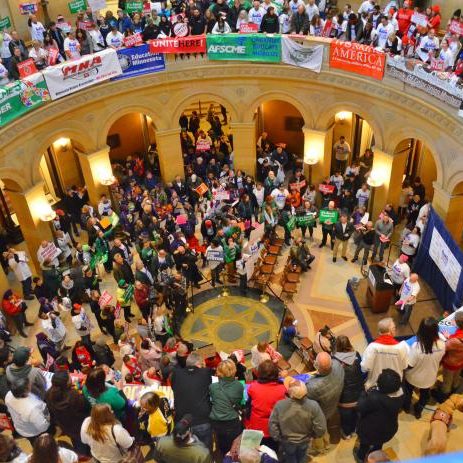

Share
A trio of new research studies shows that more people are joining unions in Minnesota and that wages in the Gopher State are growing faster than the neighboring states of Illinois and Wisconsin, as well as in the rest of the United States.
Produced by the Midwest Economic Policy Institute with researchers from the University of Illinois at Urbana-Champaign, University of Minnesota, University of Wisconsin-Madison, and University of California-Irvine, the annual State of the UnionsResearch series profiles unionization rates and hourly wages in Minnesota,Illinois, and Wisconsin.
Based on data from the U.S. Department of Labor and U.S. Census Bureau, the studies offer a comparative window into the economic effects of different state-level approaches to labor and economic policy.
“While the rise of right-to-work laws and other national economic trends are no doubt impacting unionization and wage growth, differences in state-level policymaking can either accelerate or blunt these broader trends,” said Midwest Economic Policy Institute Policy Director Frank Manzo IV. “The data shows that Wisconsin’s model has produced lower wages and slower wage growth, while Minnesota’s has had the opposite effect.”
Despite a budget crisis and efforts by its Governor to pursue an agenda similar to Wisconsin’s, the authors note that Illinois has largely maintained a status quo, augmented by the City of Chicago’s decision to raise its minimum wage.
Professor Bruno explains.
“the comparative experience of Minnesota and Illinois proves that there are steps that state policymakers can take to minimize the damage,” Bruno concluded. “With the favorability of unions now polling at their highest levels in more than 15 years, these steps should not just be seen as good politics, but as sound economic policy.”
Of the three states studied, Minnesota posted the highest wages, fastest wage growth, and actually increased its number of union members. Researchers note that the Gopher State has increased its statewide minimum wage, protected its prevailing wage law, allowed new groups of state workers to organize unions, and boosted investments in public education and public infrastructure.
In exploring the labor movement’s demographic trends, the studies highlight construction and extraction occupations as the region’s most heavily unionized across the Midwest. The researchers also note that people of color and military veterans appear have been disproportionately affected by changes to labor and collective bargaining laws in Wisconsin. Wisconsin is the only one of the three states surveyed where union representation of these groups of workers lags national averages.

Manzo added. “By enacting policies that weaken unions, the data suggests that changes to Wisconsin’s labor laws have had a disproportionately negative effect on women, veterans, and people of color when compared against these neighboring states and the nation as a whole.”
Both Manzo and Bruno noted that the studies do not capture the expected effects of the Supreme Court’s recent Janus v. AFSCME decision, which their research findswill depress public sector unionization by 8% and public sector wages by as much as $2,000 annually.
“Minnesota’s labor unions have invested resources in organizing that has resulted in new union members in a variety of industries including the public sector, hospitality, healthcare, retail, and construction,” Professor Monica Bielski Boris, co-author of the Minnesota study and Director of the Labor Education Service at the University of Minnesota added. “Unions in the state have also been working hard to mobilize existing members in the wake of the Janus decision and other threats to unionization.”
The Midwest Economic Policy Institute (MEPI) is a nonprofit organization which uses advanced statistics, reliable surveying techniques, and the latest forecasting models to develop timely and dynamic analysis of policy issues affecting the economies of the Midwest.
The Project for Middle Class Renewal at the University of Illinoisinvestigates the working conditions of workers in today’s economy and elevate public discourse on issues affecting workers with research, analysis and education in order to develop and propose public policies that will reduce poverty, provide forms of representation to all workers, prevent gender, race, and LGBTQ+ discrimination, create more stable forms of employment, and promote middle-class jobs.

